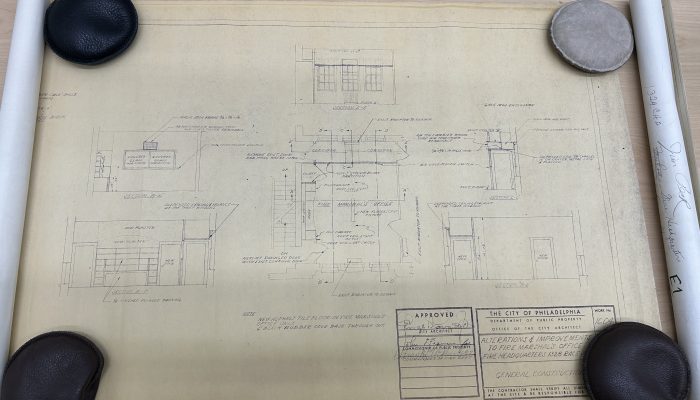When I learned I had the opportunity to intern with the City of Philadelphia, I was thrilled beyond words. Never in a million years did I imagine being chosen from over 700 applicants for the Mayor’s Internship Program (MIP). Growing up in North Philly made this opportunity even more special, as it allowed me to give back to the city that has played such a big role in shaping who I am today. My time with MIP has been nothing short of amazing, offering both personal and professional growth that I’ll cherish.
Through MIP, I was placed with the Department of Records at the City Archives Office on 548 Spring Garden Street. The City Archives is like a treasure chest of Philadelphia’s history, overflowing with thousands of records that capture the vibrant spirit of the city’s past. Managed by a fantastic team of seven, this treasure trove of historical documents is open to the public, so anyone can request to view records, which are typically in the form of paper and/or microfilm.
In my role, I frequently handled records like birth records, death records, naturalization records, and deeds. These documents are often sought by genealogists tracing their family histories or individuals seeking proof of ancestry for dual citizenship. I absolutely love the search process—it feels like being a detective uncovering hidden secrets! However, it’s important to remember that despite our best efforts, we might not always find every record. Missing records can result from various factors, such as human error or incomplete documentation. Discrepancies in historical records are also quite common, with variations in names, dates and events arising from record-keeping, differences in transcription practices, or changes over time in how information was recorded.
Records of minority groups can be particularly elusive; often due to issues like racism, sexism, and homophobia which led to the obstruction or neglect of these records. Understanding these challenges helps us appreciate why certain histories are underrepresented and highlights the importance of preserving the records we do have regarding these communities. It’s also vital to recognize that these communities are not monolithic, so accurate identifiers are crucial when cataloging records to reflect their diversity. Archivists play a unique and crucial role, not just in maintaining records but in deciding which records to keep or discard. Reflecting on the past basis and striving to improve our practices today are essential. By recording events as accurately and comprehensively as possible, archivists can help ensure future generations have access to a complete and reliable historical record.
One of the highlights of my internship was working on the firehouse plans project. This was incredibly rewarding because I was responsible for accessioning and processing of an entire collection from start to finish. My tasks included receiving and checking all the plans, carefully bagging and tagging them to keep them organized and easily identifiable. After organizing the plans, I reviewed the existing finding aids to find the best record group for the collection and updated the finding aid to accurately reflect the contents. Finding aids are documents, that provide details about a specific collection of records within archives. This ensures that future researchers will have a clear and comprehensive guide to the materials.
Overall, diving into the world of archiving has been an exhilarating experience! I’ve gained hands-on experience with everything from accessioning and processing to consulting, and each task has been both enriching and exciting. I’m truly grateful for the opportunity to develop a well-rounded understanding of the profession. For anyone considering a career as an archivist or in a related field such as library science, history, or records management, I highly recommend interning with the City of Philadelphia’s Department of Records. It’s an amazing opportunity you won’t want to miss!




